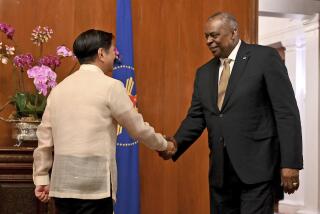Aquino Urges Vote to Put Bases Issue Before the People : Philippines: She hopes to counter lawmakers’ likely rejection of a lease with the U.S. military.
- Share via
MANILA — President Corazon Aquino, facing the Philippine Senate’s almost-certain rejection of a new military bases treaty with the United States, called Sunday for the issue to be decided in a popular referendum.
Aquino conceded in a nationally televised speech that rejection of the lease agreement for the Subic Bay Naval Base now seems likely. The Senate, which rejected the agreement in a preliminary 12-11 vote last Monday, is casting a final vote on the treaty today.
The immediate future of the Subic Bay base, which employs 8,000 U.S. service personnel, was less clear. The Philippines constitution adopted in 1987 calls for the withdrawal of foreign troops by Sept. 16 in the absence of a new treaty.
But a U.S. official noted that under terms of a U.S.-Philippines pact signed in 1966, the United States has until September, 1992, to complete its withdrawal from the base.
“Our presumption is that we would await the results of the referendum,” U.S. Embassy spokesman Stanley Schrager said.
Opinion polls have indicated that a majority of the Filipino people support the continued presence of U.S. forces in the country, largely because of the enormous importance of the base to the nation’s fragile economy.
The proposed 10-year treaty calls for the United States to pay the Philippines $203 million in rent each year. In addition, hundreds of millions of dollars reach the Philippines in indirect payments, and the naval base provides about 40,000 local jobs in an area hit hard by unemployment.
Opponents of the treaty contend that it is too lopsided in favor of the United States and preserves a dependent relationship between the Philippines and its former colonial master.
Aquino said that while the Senate’s power to ratify the treaty is enshrined in the constitution, it is an “even more basic right” of the people to participate in decision-making on matters of national importance.
Aquino set in motion a complex and untried law that allows a popular referendum on any matter after 10% of the nation’s voters sign an initiating petition.
“Once again, people power is being called upon to break a possible stalemate where the exercise of the prerogative may not be reflective of the people’s will,” Aquino said in her TV address Sunday.
Aquino did not specify what would be considered in the proposed referendum or when it might be held. Legal experts said that merely overturning the Senate’s decision might prove insufficient to stand up in court and that she might have to seek a formal amendment to the constitution to permit the continued presence of foreign troops.
The constitution provides that no foreign troops are permitted in the Philippines past the September deadline “except under a treaty duly concurred in by the Senate and, when the Congress so requires, ratified by a majority of the votes cast by the people in a national referendum held for that purpose.” The constitution cannot be amended until five years after its ratification--or until February of next year.
The Philippines is holding national elections for a new government next May, and the proposed referendum could cause confusion by overlapping with the campaign period.
“The whole thing is a political quagmire,” said Alex Magno, head of the political science department at the University of the Philippines. “There will be long battles in the Supreme Court, which could result in an embarrassing defeat for the president. The whole process will take its toll on the election.”
Some supporters of the bases agreement are calling on the government to adopt a so-called Greek option, similar to one used by Athens in 1988, in which a decision to terminate a bases agreement with the United States is simply postponed until after the elections are held.
The Bush Administration has said that Washington is not willing to negotiate further on the lease arrangements that were worked out over the summer. Earlier in the year, it abandoned Clark Air Base after that facility was devastated by the erupting Mt. Pinatubo volcano.
Schrager, the U.S. Embassy spokesman, said the United States continues to support Aquino’s efforts at winning ratification of the Subic Bay treaty and stands by her in the “additional steps she has proposed.”
The Pentagon has not disclosed where it will reposition its forces if the Subic base is closed. Japan and South Korea have offered expanded facilities to U.S. forces, but the closure would leave the United States without a base anywhere in southeast Asia, except for on the tiny island of Diego Garcia in the Indian Ocean.
More to Read
Sign up for Essential California
The most important California stories and recommendations in your inbox every morning.
You may occasionally receive promotional content from the Los Angeles Times.










